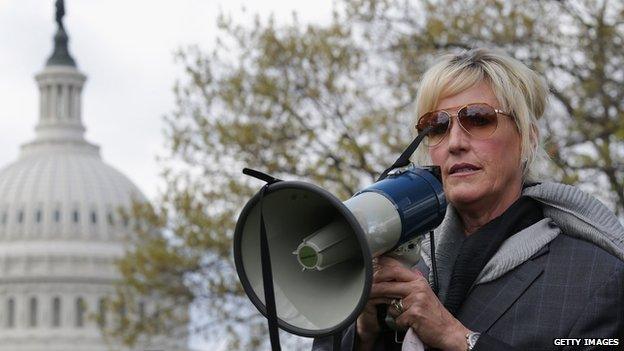Erin Brockovich calls for end to Bayer's Essure
- Published
Erin Brockovich on Essure: "There is something wrong with the product"
She was the single mother who took on corporate America and won.
Julia Roberts played her in the Hollywood version of her life's work.
Now Erin Brockovich is working to raise awareness about what she considers a dangerous method of permanent birth control - Essure.
Essure is a quick, non-surgical, permanent method of sterilising women. The procedure involves inserting tiny coils into the fallopian tubes to block sperm from reaching eggs. It has been hailed as an affordable, less invasive method of permanent birth control; an alternative to surgical procedures that block, cut or seal the fallopian tubes.
But Ms Brockovich has joined a growing chorus of women questioning the procedure, saying the product has injured thousands of women.
"It's perforating uteruses; it's perforating colons; it's perforating the lining of the stomach," Ms Brockovich tells the BBC.
"Some women have whole body scans - they don't know where it is, because it's just floating free in the body.
"One woman had the procedure and she ended up getting pregnant. She couldn't have [the coil] removed and in the 25th week of the pregnancy it broke and migrated, perforating the amniotic fluid.
"The child didn't make it."
'Science key'
Bayer, which makes the product, says it empathises with any woman suffering, but argues that science and US Food and Drug Administration (FDA) data proves its product is overwhelmingly safe.
"There are a lot of emotions involved," says Bayer's US medical director, Dr Edio Zampaglione. "The science needs to guide our understanding. Science points to the fact that Essure is a safe and effective product."

Julia Roberts won an Oscar for her portrayal of Erin Brockovich in the 2000 film
Bayer says 750,000 women have had the procedure worldwide, most with no complaint.
The FDA says that Essure is the only sterilisation choice available in the US that does not require a skin incision and that the procedure is 99.83% effective when used correctly. Most women who have the procedure can go home 45 minutes later and return to normal activity within one to two days, according to the FDA. The procedure is not reversible.
The method was approved in the US in November 2002. From then until 25 October 2013, the FDA says it received 943 reports of adverse events related to Essure, mainly for pain (606 of the complaints).
About 1,000 more complaints have been sent to the FDA in a voluntary reporting system. Doctors are not obliged to report complaints, and many women say they did not know how to report problems.
A Facebook group called Essure Problems, external has 8,592 members who call the method "E-hell" and mostly complain about pain, bleeding and bloating from the device. Some say they've had coils break and perforate their internal organs.
'Discrimination'
Kim Myers had the device implanted in 2008 and says the pain was debilitating for three years until she had a hysterectomy and the Essure hardware removed. The pain wreaked havoc on her marriage and stopped her from riding horses competitively.

Ms Brockovich continues to campaign hard against contaminated water in the US
"I have never in my life felt discriminated against like I have with this whole thing with Essure," Ms Myers says, adding that she felt her doctor pressured her to have it installed.
When she complained about the pain, "he told me, 'you're a silly little woman, you're hormonal.' That's the furthest thing from the truth."
The women cannot sue Bayer because of "pre-emption" laws that protect makers of medical devices from class-action lawsuits. Pre-emption means US federal law pre-empts lawsuits based on state law claims, such as negligence or failure to warn.
The laws were intended to stop frivolous lawsuits, but consumer rights advocates like Ms Brockovich say the laws need to be amended.
"We need to hold companies accountable and in this situation Bayer can't just turn their head and go 'these 8,000 women don't matter'. I think that they have a responsibility, a duty, to take a look and, if there's a question, pull it," Ms Brockovich says.
"One's too many. Eight thousand women? You cannot disregard that voice collectively. There is something wrong with the product."
Ms Brockovich urges women to share their stories and to put pressure on Bayer to remove Essure from the market. And she knows what it is like to take on big corporate interests - she was instrumental in winning the largest class action lawsuit in US history, despite her lack of a formal legal education. The case was against Pacific Gas and Electric Company of California for contaminated water.
'Disconnect'
Bayer says Ms Brockovich's concerns are misguided.

Bayer says it would not risk its long-established reputation for the sake of Essure if it was not sure of its safety
Dr Zampaglione of Bayer, which is a well-established brand that is more than 150 years old, says there is no chance of the company removing Essure from the market.
"I can tell you it's a very low percentage [of women reporting adverse effects]," he says. "It's consistent with clinical trials and consistent with what the FDA is seeing."
Dr Zampaglione says the company has two free numbers for patient complaints and that they want to hear from any women experiencing problems with Essure. He also says the company would not squander its reputation on a product it did not believe in 100%.
"We are trying to engage with patients, with women who feel they have faced injury and adverse events. I can't comment on Erin's views, but I do see a disconnect - we are in the business of providing quality products and devices."
- Published29 April 2013
